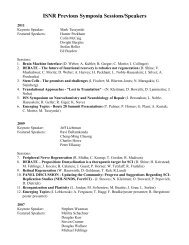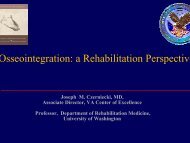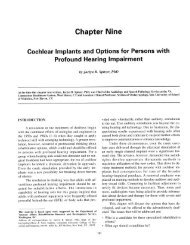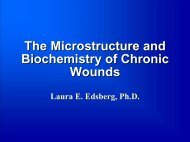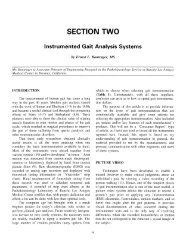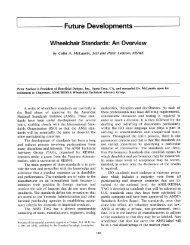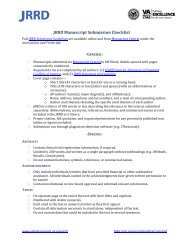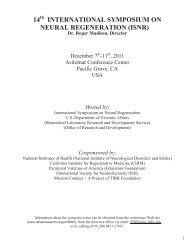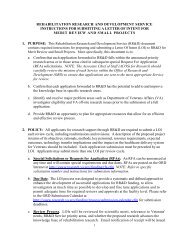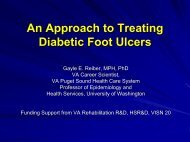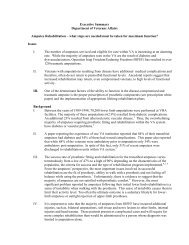Pharmacotherapy for posttraumatic stress disorder - Rehabilitation ...
Pharmacotherapy for posttraumatic stress disorder - Rehabilitation ...
Pharmacotherapy for posttraumatic stress disorder - Rehabilitation ...
You also want an ePaper? Increase the reach of your titles
YUMPU automatically turns print PDFs into web optimized ePapers that Google loves.
an assessment of the response to initial pharmacotherapy<br />
within the primary or specialty medical care setting.<br />
CONCLUSIONS<br />
Providing evidenced-based pharmacotherapy <strong>for</strong><br />
nightmares, anxiety, irritability, and other PTSD symptoms<br />
in an empathic setting that encourages engagement<br />
in treatment can be of great benefit to patients and the<br />
treatment team and can improve treatment outcomes.<br />
Following the CPG will help bridge the gap between primary<br />
care providers, nonpsychiatric specialist physicians,<br />
and mental health care, leading to a more engaged<br />
and less anxious patient.<br />
Several important practices can maximize treatment<br />
effectiveness <strong>for</strong> patients with PTSD and trauma-related<br />
di<strong>stress</strong> in the clinical setting. Effective screening <strong>for</strong><br />
PTSD and trauma-related di<strong>stress</strong> is important initially to<br />
improve patient and staff understanding of the emotional<br />
factors affecting recovery. The PCL can be effectively<br />
used to monitor trauma-related di<strong>stress</strong> and is quite easy<br />
to administer either as a manual paper copy or within the<br />
VA electronic medical record.<br />
The CPG provides a solid foundation <strong>for</strong> pharmacotherapy<br />
preceding more complex and nuanced treatment<br />
by mental health professionals in the future. It provides<br />
effective recommendations <strong>for</strong> first-line pharmacotherapy<br />
and psychotherapy options <strong>for</strong> patients. First- and<br />
second-line pharmacotherapy must be distinguished and<br />
discussed with patients in the context of a strong treatment<br />
alliance.<br />
ACKNOWLEDGMENTS<br />
Author Contributions:<br />
Analysis and interpretation of data: M. Jeffreys, B. Capehart,<br />
M. J. Friedman.<br />
Drafting of manuscript: M. Jeffreys, B. Capehart, M. J. Friedman.<br />
Critical revision of manuscript <strong>for</strong> important intellectual content:<br />
M. Jeffreys, B. Capehart, M. J. Friedman.<br />
Administrative, technical, or material support: M. J. Friedman.<br />
Financial Disclosures: The authors have declared that no competing<br />
interests exist.<br />
Funding/Support: This material was unfunded at the time of manuscript<br />
preparation.<br />
REFERENCES<br />
711<br />
JEFFREYS et al. <strong>Pharmacotherapy</strong> <strong>for</strong> PTSD<br />
1. Kessler RC, Sonnega A, Bromet E, Hughes M, Nelson CB.<br />
Posttraumatic <strong>stress</strong> <strong>disorder</strong> in the National Comorbidity<br />
Survey. Arch Gen Psychiatry. 1995;52(12):1048–60.<br />
[PMID:7492257]<br />
http://dx.doi.org/10.1001/archpsyc.1995.03950240066012<br />
2. Dohrenwend BP, Turner JB, Turse NA, Adams BG ,<br />
Koenen KC, Marshall R. Continuing controversy over the<br />
psychological risks of Vietnam <strong>for</strong> U.S. veterans. J Trauma<br />
Stress. 2007;20(4):449–65. [PMID:17721952]<br />
http://dx.doi.org/10.1002/jts.20296<br />
3. Hoge CW, Terhakopian A, Castro CA, Messer SC, Engel<br />
CC. Association of <strong>posttraumatic</strong> <strong>stress</strong> <strong>disorder</strong> with<br />
somatic symptoms, health care visits, and absenteeism<br />
among Iraq war veterans. Am J Psychiatry. 2007;164(1):<br />
150–53. [PMID:17202557]<br />
http://dx.doi.org/10.1176/appi.ajp.164.1.150<br />
4. Spiro A 3rd, Hankin CS, Mansell D, Kazis LE. Posttraumatic<br />
<strong>stress</strong> <strong>disorder</strong> and health status: the veterans health<br />
study. J Ambul Care Manage. 2006;29(1):71–86.<br />
[PMID:16340621]<br />
5. Magruder KM, Frueh BC, Knapp RG , Davis L, Hamner<br />
MB, Martin RH, Gold PB, Arana GW. Prevalence of <strong>posttraumatic</strong><br />
<strong>stress</strong> <strong>disorder</strong> in Veterans Affairs primary care<br />
clinics. Gen Hosp Psychiatry. 2005;27(3):169–79.<br />
[PMID:15882763]<br />
http://dx.doi.org/10.1016/j.genhosppsych.2004.11.001<br />
6. Lecrubier Y. Posttraumatic <strong>stress</strong> <strong>disorder</strong> in primary care:<br />
a hidden diagnosis. J Clin Psychiatry. 2004;65(Suppl 1):<br />
49–54. [PMID:14728097]<br />
7. Richardson JD, Elhai JD, Pedlar DJ. Association of PTSD<br />
and depression with medical and specialist care utilization<br />
in modern peacekeeping veterans in Canada with healthrelated<br />
disabilities. J Clin Psychiatry. 2006;67(8):1240–45.<br />
[PMID:16965202]<br />
http://dx.doi.org/10.4088/JCP.v67n0810<br />
8. Hankin CS, Spiro A 3rd, Miller DR, Kazis L. Mental <strong>disorder</strong>s<br />
and mental health treatment among U.S. Department<br />
of Veterans Affairs outpatients: the Veterans Health Study.<br />
Am J Psychiatry. 1999;156(12):1924–30.<br />
[PMID:10588406]<br />
9. Dobie DJ, Kivlahan DR, Maynard C, Bush KR, McFall M,<br />
Epler AJ, Bradley KA. Screening <strong>for</strong> post-traumatic <strong>stress</strong><br />
<strong>disorder</strong> in female Veteran’s Affairs patients: validation of the<br />
PTSD checklist. Gen Hosp Psychiatry. 2002;24(6):367–74.<br />
[PMID:12490337]<br />
http://dx.doi.org/10.1016/S0163-8343(02)00207-4<br />
10. Bullman TA, Kang HK, Thomas TL. Posttraumatic <strong>stress</strong><br />
<strong>disorder</strong> among Vietnam veterans on the Agent Orange<br />
Registry. A case-control analysis. Ann Epidemiol. 1991;



